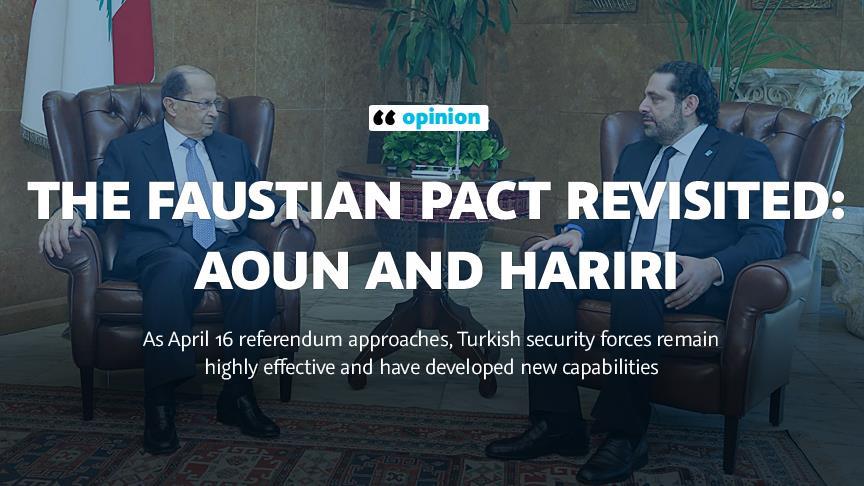OPINION - The Faustian pact revisited: Aoun and Hariri
Comments by Lebanese President Michel Aoun and Prime Minister Saad al-Hariri on Hezbollah lay bare political divisions

By Dr. Makram Rabah

BEIRUT
Anyone who follows Lebanese politics and
These developments, more often than not, are triggered by regional factors as well as the drive of the local actors who jump on any chance to capitalize on these situations.
The recent twist of events which led to the election of Michel Aoun to the presidency after Samir Geagea, the leader of the Lebanese Forces and Saad al-Hariri, the head of the Future movement both endorsed Aoun, is a case in point.
Long considered to be their opponent, Geagea and Hariri each brokered a separate deal with the 82-year-old former army chief who reciprocated by issuing a few pledges which affirmed Lebanon’s neutrality amid the ongoing conflicts in the region, especially in Syria.
In his confirmation speech Aoun, a strategic ally of Hezbollah and Bashar
However, the alliance which brought Saad al-Hariri back as prime minister is at risk of crumbling after President Aoun repeatedly declared the arms of Hezbollah, Iran’s proxy militia in Lebanon, were vital for country’s protection, taking a clear stand with the Iran-Syria axis.
As a result, Saad al-Hariri unleashed a verbal barrage declaring that Hezbollah was merely peddling an Iranian agenda and their involvement in Syria to defend the Assad regime was living testimony to such a claim.
Hariri’s violent comments, however, did not mention Aoun nor that by relinquishing his customary role as an arbitrator, and siding with Iran, he was compromising Lebanon’s standing in relation to the Arab Gulf states, especially Saudi Arabia.
The Sunni-Shia schism and the wars in Yemen and Syria have led Saudi Arabia to take a staunch attitude towards its own allies, who have failed on many occasions to effectively counter Iran’s influence in Lebanon.
While Hariri has constantly denied that Saudi Arabia makes this claim, the suspension of a $3 billion Saudi package to the Lebanese army as well as their lukewarm reception of Aoun when he recently visited Saudi Arabia speaks volumes.
Therefore Aoun’s reckless and irresponsible -- yet calculated -- statements will further estrange Hariri from the Saudis and might ultimately force him to walk away from this unholy alliance and consequently the national unity government he presides.
However, this scenario might prove more difficult given Hariri’s collusion with Aoun and his associates over a number of domestic issues, primarily the extraction of gas off the Lebanese coast as well as a number of other projects of an entrepreneurial nature.
Hariri, who inherited a business as well as a political empire from his late father, soon found himself politically outmaneuvered by his opponents and facing financial difficulties and even alleged bankruptcy.
Consequently, according to many, Hariri’s decision to vote for Aoun was a desperate attempt to leverage his political and financial status, something which the premiership could possibly remedy.
These realities are equally known to Hariri’s former opponents turned allies who recognize quite well that his ability to maneuver or truly break rank with their alliance is a luxury he cannot truly afford.
As a result, there is nothing preventing Aoun from pursuing his adoption of the ethos of resistance complicating matters even further for Lebanon not only with Saudi Arabia but also with a new American administration adamant on confronting Iran and its subsidiaries in the region.
Consequently, if Hariri truly intends to salvage his own career and to shield Lebanon from the implications of Iranian hegemony, he should not allow Aoun to extort him in this manner, nor hold the Lebanese hostage by exposing them regionally as well as internationally.
Saad al-Hariri can continue to ignore the obvious and hide behind his pledges to improve the economy, provide faster Internet or fix a few potholes. This, however, will not change the fact that Lebanon is under constant threat from Iran and their auxiliaries.
The only way going forward would simply be for Hariri as well as Geagea to show Aoun that despite their heavy investment in his presidency, a continued breach of their original agreement would lead to their walking out from a government incapable of protecting Lebanon and its people.
*Opinions expressed in this piece are the author’s own and do not necessarily reflect Anadolu Agency's editorial policy.
Anadolu Agency website contains only a portion of the news stories offered to subscribers in the AA News Broadcasting System (HAS), and in summarized form. Please contact us for subscription options.







